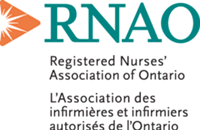Nurses call to halt plans to stop funding critical opioid treatment sites
TORONTO, April 2, 2019 /CNW/ - With so many lives swept up in an opioid epidemic that is killing thousands of Canadians, the Ontario government must continue to fund critical treatment sites that provide life-saving services to those in need, the Registered Nurses' Association of Ontario says.
Instead, the government announced March 29 it was ending funding to three sites and postponing its decision on a fourth site that serves the most clients in Ontario, Toronto-based The Works.
The decision was revealed to those who manage three sites in Toronto and one in Ottawa, on the final Friday for which they had provincial funding. The timing conflicts with evidence the Doug Ford government cited when it announced last October it would fund consumption and treatment services. Back then, following a year in which 1,265 Ontarians died from opioid overdoses, the government conducted a review that concluded, "Combating the opioid crisis will require a comprehensive and coordinated strategy."
It was the lack of coordination that was striking when the province last week announced the change. While there is always room to improve and expand these vital services, the provincial government first must engage frontline providers, organizations like RNAO that provide expertise, and members of the Opioid Emergency Task Force.
Unacceptable - that's how this provincial edict was described by the chair of Toronto's board of health, Joe Cressy, who told media we cannot afford to go backwards in the "defining health crisis of our time." RNAO concurs. The Ford government must consult first and collaborate carefully if Ontario is to avoid losing more lives needlessly to opioids.
"It is unconscionable that any of these clinics has lost funding in the midst of an opioid crisis, and even worse that this was done with no plan to transition vulnerable clients to sites where they feel as safe," RNAO CEO Dr. Doris Grinspun says.
RNAO urges the government to preserve the safety net for vulnerable citizens who depend upon harm reduction and treatment services by continuing to fund Ottawa Public Health and Toronto's The Works, St. Stephen's, and Street Health. At the latter alone, 60 per cent of its clients are women who are homeless.
"De-funding needed consumption and overdose prevention services is a bad decision. This needs rethinking, and this rethinking must be focused on saving lives," says RNAO president Dr. Angela Cooper Brathwaite.
On Tuesday, the province's Chief Medical Officer of Health, Dr. David Williams told RNAO the province is doubling overall funding for these vital services. More funding is welcomed, but if it is to do the most good, the provincial government can't afford to make decisions in a silo. It must instead consult frontline providers, key experts and people with lived experience. Such consultation and planning is vital so that vulnerable clients don't fall through the cracks.
RNAO is the professional association representing registered nurses, nurse practitioners, and nursing students in Ontario. Since 1925, RNAO has advocated for healthy public policy, promoted excellence in nursing practice, increased nurses' contribution to shaping the health- care system, and influenced decisions that affect nurses and the public they serve. For more information about RNAO, visit RNAO.ca or follow us on Facebook and Twitter.
SOURCE Registered Nurses' Association of Ontario

To arrange an interview, please contact: Jonathan Sher, Senior Communications Officer and Writer, Registered Nurses' Association of Ontario (RNAO), Phone: (416) 599-1925 / 1-800-268-7199 ext. 250 (toll free), Cell: (647) 217-2689, Email: [email protected]

Share this article